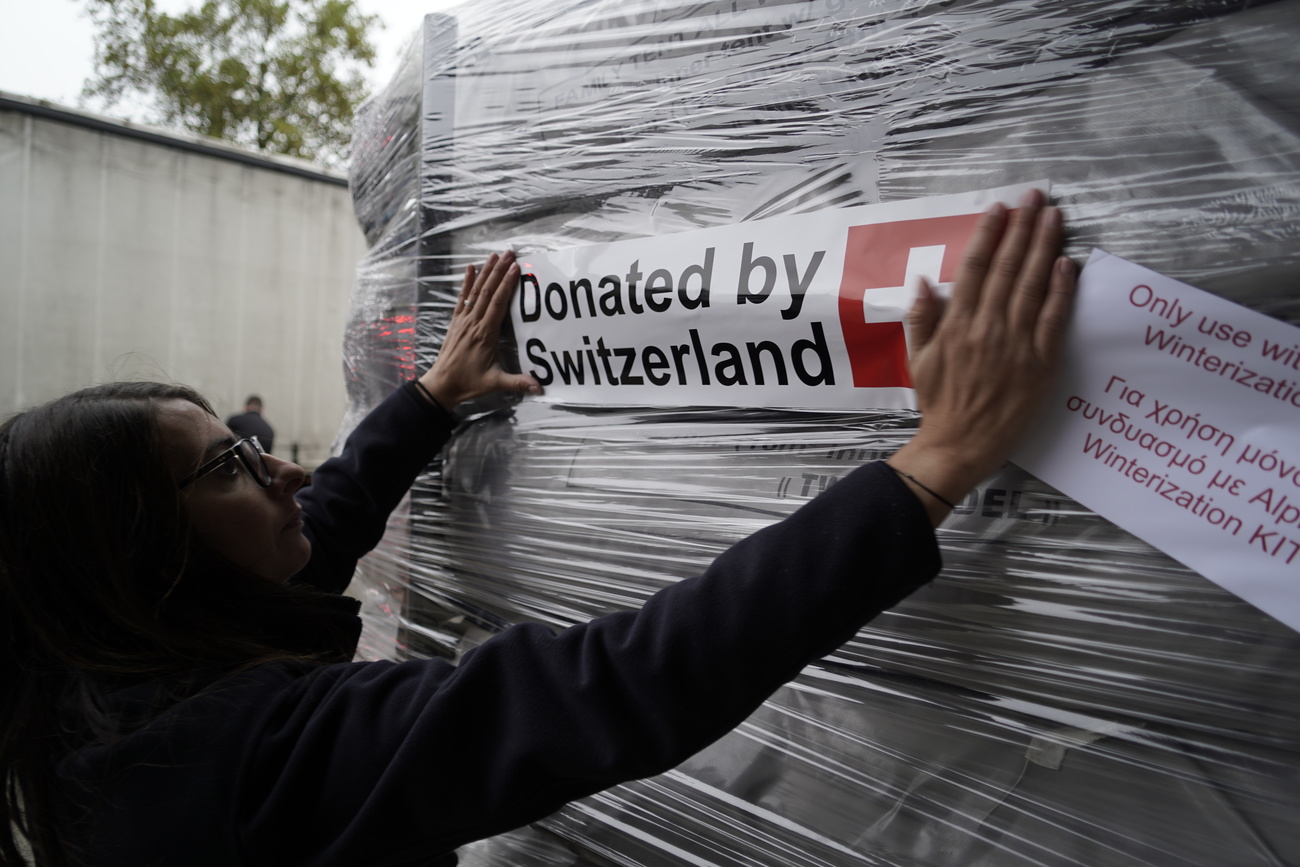
Proposed Swiss cuts to international aid mean less for the needy

International cooperation organisations have been feeling the pressure since the Swiss government announced cuts in aid to developing countries to free up more money for defence spending. The most vulnerable populations worldwide may have to bear the brunt of this, while the needs on the ground are actually increasing.
“We will have to shut down existing projects and cancel some that are at the planning stage,” says Catherine Schümperli Younossian, secretary-general of the Geneva federation for cooperation and development. NGOs working in development and humanitarian aid have been living in uncertainty since the government’s announcement of budgetary reductions in international cooperation.
“We’ve been told to expect cuts of 8% to 20% in the 2025 budget,” she explains, citing the Swiss Agency for Development and Cooperation (SDC).
On November 13, the finance committee of the House of Representatives voted to cut the international cooperation allocation by CHF250 million ($280 million) for the 2025 budget and to increase the defence allocation by CHF530 million. The Senate had initiated the debate in summer by proposing cuts of CHF2 billion in the aid sector for the budget period 2025-2028. The two houses of parliament are to come to a decision during the winter session.
This is not the only threat to the aid sector, Younossian insists. In its plan for savingsExternal link presented at the end of September, the government proposed to freeze all spending on international cooperation from 2027 on, for a saving of CHF320 million. Only the armed forces would get a budget increase, to the tune of CHF4 billion.
These announcements have been a shock to a country that has traditionally justified its neutralityExternal link in world conflicts by pointing to its humanitarian commitment. Aid for development and peace is a pillar of Switzerland’s diplomatic identity. “Bit by bit they are chipping away at aid to the poorest countries,” Younossian says. “Yet world stability depends on including the emerging nations too.”
Uncertain future
Closing down development projects, less humanitarian aid, restructuring and job losses – the consequences of budget cuts are hard to predict at this stage. “We’re waiting for figures to arrive at the end of this year. Uncertainty is very difficult, and our work goes unnoticed despite the increasing needs,” Younossian says.
The same complaints are to be heard from UN humanitarian organisations and agencies, already facing budget cuts. “Cutting humanitarian aid budgets has serious consequences for people needing vital assistance around the world,” says Jens Laerke, spokesperson for the Office for the Coordination of Humanitarian Affairs (OCHA) of the UN, based in Geneva. He is expecting reductions in food aid, and planned projects having to be cancelled.
In Afghanistan, 183 health centres have closed this year, limiting access to care for 2.1 million people. In Lebanon, a reduction of 40% in monetary aid leaves 115,500 refugee families without help in meeting their basic needs. Cuts to food aid in Zimbabwe, South Sudan and Afghanistan have aggravated food insecurity there for already fragile communities. “In the end, the most vulnerable groups are the hardest hit,” Laerke says.
The Swiss foreign ministry didn’t want to comment on the potential repercussions of these decisions on the activities of the SDC, saying it was too early. “It’s currently difficult to predict concrete consequences of any reduction before parliament has its final say,” ministry spokesperson Valentin Clivaz told SWI swissinfo.ch.
In July the foreign ministry estimated that a cut of CHF2 billion, as called for by the Senate, would mean Switzerland withdrawing from six to eight “priority”External link countries. Between now and the end of the year, Switzerland will be shutting down its development and cooperation work in Latin America, reducing the number of priority countries from 46 to 35, in order to concentrate more on Eastern Europe, Africa, the Middle East and Asia.
Ukrainian reconstruction: who will pay?
In its future strategy for international cooperation, the government intends to allocate CHF1.5 billion – 13% of the total cooperation budget – to the reconstruction of Ukraine. This decision has not gone down well with development cooperation organisations.
“The reallocation is being done at the expense of developing countries,” says Younossian. A third of this budget is to be made available to the Swiss private sector to help rebuild Ukraine. This has never happened before in the history of Swiss cooperation efforts.
“We seem to be dealing with a paradigm shift here,” she says. “Instead of giving priority to emerging nations and hard-hit populations, as the federal legislation on cooperation actually envisages, they are cutting aid to the poorest in order to fund a hypothetical reconstruction of Ukraine, to benefit Swiss companies.” She thinks extra funds should be given to Ukraine in the form of a special allocation, as was the case with Eastern European countriesExternal link after the fall of the Berlin Wall. Asked about this, the foreign ministry declined to comment.

More
War in Ukraine erodes European support for humanitarian disarmament
In the media, parliamentarians have been admitting some concern about the repercussions of these cuts on the global image of Switzerland and Geneva.
“Trade-offs between our security spending and our humanitarian commitment would be a mistake,” says Radical-Liberal politician Cyril Aellen in an opinion piece published in the newspaper Le Temps.External link “One won’t work without the other, and our funding choices should have one single goal: our contribution to finding a lasting peace.” Asked about this, the foreign ministry declined to comment.
Unmet needs
War in Ukraine and in the Middle East, the Covid pandemic, climate disasters: the humanitarian needs of the world are expanding relentlessly, but funding is unable to keep up. As of November 6, in 2024 only 37% of humanitarian needs found financial support, against 45% in 2023 and more than 60% ten years ago, according to figures from the OCHAExternal link.
“The gap between needs and available resources continues to widen,” warns the Geneva-based International Committee of the Red Cross, which announced in August that it lacked resources to respond to the hundreds of conflicts going on. “We may be forced to cut back on our operations and concentrate just on the most essential humanitarian activities,” said the Red Cross in reaction to the news of impending cuts.
The “forgotten crises” and long-term conflicts around the world, often little reported in the media, are particularly vulnerable to funding cuts. “We’ve observed a growing strain on resources in several regions: sub-Saharan Africa, Iraq, Syria, Afghanistan, Somalia and Libya,” notes Red Cross spokesman Christoph Hanger. “In all these zones, millions of people lack access to drinking water, food and medical care.”
In 2023, Switzerland responded to UN appeals for humanitarian aid to the tune of $836 million (CHF745 million), against $562 million so far this year, according to OCHA figures.
“There is undeniably a lack of global funding of humanitarian aid by institutional donors. The partners we work with on the ground are experiencing considerable difficulties,” says Stephen Cornish, director-general of Médecins Sans Frontières in Switzerland. “This general tendency needs to be reversed, and Switzerland has an important role to play here.”
Worldwide trend
Budget cuts to development aid and humanitarian work are not unique to Switzerland, says Karl Blanchet, director of the Geneva Centre of Humanitarian Studies. “This year France cut its development aid by 11%,” he notes. “Germany, the second-biggest humanitarian donor, expects to cut its budget for humanitarian operations by 54%.”
This tendency is visible all over the world, Blanchet says. He points out that funding in the humanitarian sector has gone back to 2021 levels, whereas needs are actually increasing.
“This trend can be explained to some extent by funding going to Ukraine, but there’s a kind of nation-centred retrenchment going on which is worrying.”
Edited by Imogen Foulkes/pt/sj. Adapted from French by Terence MacNamee/ts

In compliance with the JTI standards
More: SWI swissinfo.ch certified by the Journalism Trust Initiative































You can find an overview of ongoing debates with our journalists here . Please join us!
If you want to start a conversation about a topic raised in this article or want to report factual errors, email us at english@swissinfo.ch.